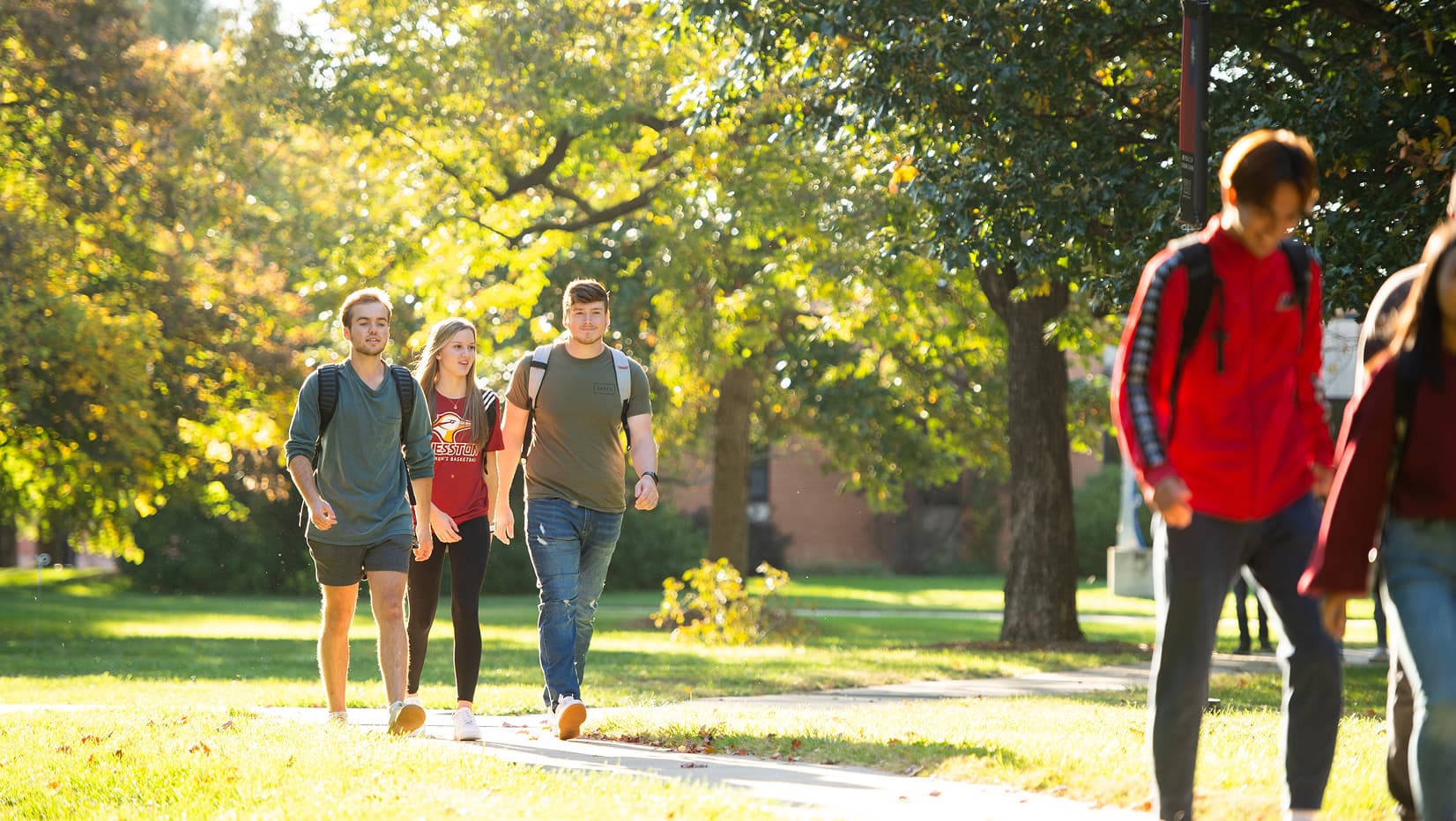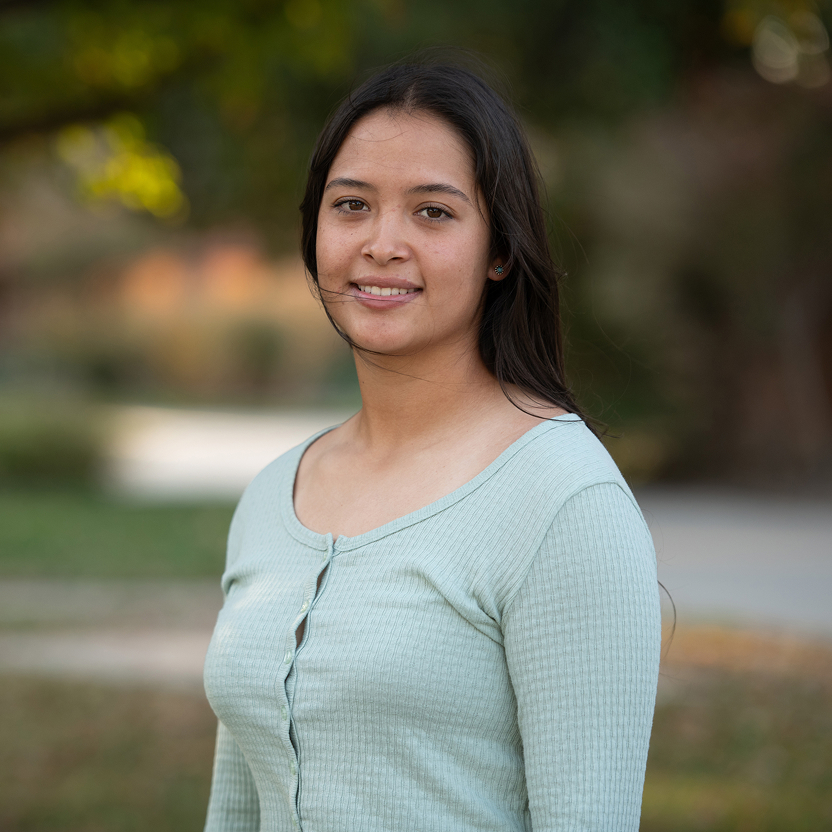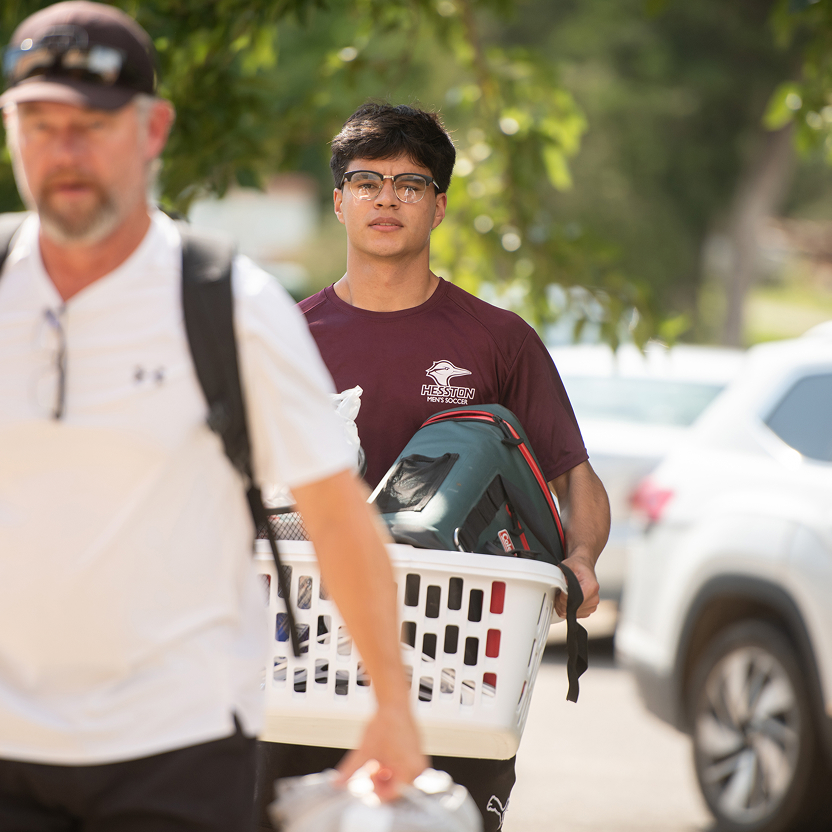

Sending your student to college is a big step, and we’re here to help support both of you through the transition. We’ve answered some of the most common questions from parents about housing, health forms, campus life and more. Our goal is to keep you informed and involved as your student begins their next chapter.
The Hesston College Health Form and Area Health Services
- What Hesston College health forms are required?
- All required health forms must be completed and returned before move in. Immunization history must be completed by a health care provider, or you may attach official documentation to the immunization history form. Required health forms include:
- What are the required immunizations to be a student at Hesston College?
-
- Tuberculin skin test screening form
- TB skin test or chest x-ray (if students answer yes on any question of the Tuberculosis screening form)
- MMR (measles, mumps, rubella)
- TDAP (tetanus toxoid, diptheria, pertussis)
- Meningococcal vaccine (required of dorm students only)
- Chicken pox (varicella) recommended
-
- Does my student need a physical to attend Hesston College?
- No, a physical is not required to attend Hesston College, however athletes, aviation students and nursing students have their own requirements.
- What’s the difference between a Td and a TDAP?
- A Td is a tetanus toxoid/diphtheria vaccine, and the TDAP consists of the tetanus toxoid/diphtheria/pertussis vaccine which is the required Hesston College vaccine.
- Where do I obtain my student’s immunization records?
- Contact your health care provider, doctor's office or health department for your student’s records. It sometimes also appears on the student’s high school transcript.
- Am I required to have a doctor's signature on the health form?
- Either a health care provider's (doctor or nurse) signature is required or official documentation of immunizations must be attached to the immunization form.
- What happens if I don't get my student’s health form completed before arriving on campus?
- Your student must turn in the completed health form before moving into the residence halls and attending classes. Any exceptions must be approved by the vice president of student life.
- What health services are provided for students in Hesston and in the surrounding area?
- NMC Health Family Medicine (620-327-2440) and Partners in Family Care (620-327-2314) in Hesston serve the local community. Medical office staff try to work students into the schedule. In an emergency, students should contact their resident director or community assistant, who will call for appropriate help. Other nearby providers include:
- Harvey County Health Department, Newton, 316-283-1637
- Health Ministries Clinic, Inc., Newton, 316-283-6103
- Hesston Dentistry LLC, 620-327-2887
- Legacy Eye Care, 620-327-2800 or 800-886-1007
- NMC Health, a full-service hospital, 316-283-2700
- Prairie View Mental Health Center, Newton, 316-284-6400
- NMC Health Family Medicine (620-327-2440) and Partners in Family Care (620-327-2314) in Hesston serve the local community. Medical office staff try to work students into the schedule. In an emergency, students should contact their resident director or community assistant, who will call for appropriate help. Other nearby providers include:
- Does Hesston College require students to carry health insurance?
- Yes. For details visit the Student Handbook page on health insurance.
Transportation To and From Campus
- Does the college provide transportation services to and from campus?
- During Opening Weekend, the college will provide transportation from Wichita airport and bus station and the Newton train depot free of charge. This service will be provided at regular intervals throughout the weekend.
- Students may request transportation to and from the airport, train depot and bus station listed above on other occasions as well. Students pay a fee of $65 for a trip to the Wichita bus station or airport or $25 for a trip to the Newton train station when they request transportation. The student life office asks that all such requests be made at least a week in advance of the trip.
- Are students allowed to bring a personal vehicle?
- Students may bring a car, pickup or motorcycle to campus. Each vehicle must be registered with the campus facilities department. The owner must accept all liability for that vehicle.
Student Performances and Chapels
- How can I watch my student's performances?
- Parents who wish to see their student participate in sports or music may watch live webcasts of most home concerts and sporting events (also recorded to view later). No “away” events are recorded or offered by Hesston College. Athletic events are streamed through the KJCCC network and music department events are at the livestream page.
- How can I get access to the formation (formerly chapel and forum) schedule and presentations?
- The college posts the formation schedule and video files of most formation presentations on the livestream page.
Campus Resource List for Parents
- Who do I contact if I have administrative questions?
- The president, vice president of student life or vice president of academics are the ones to call or email for administrative issues. The business manager, director of financial aid and student support services (which includes campus counselor, international support counselor and director of dining services) may address more specific aspects of your student's experience. All are listed on the college's office directory.
- Who does my student contact for support services on campus?
- The student life staff (resident directors, campus pastor, campus counselor, vice president of student life) are the main resources for student and campus life, spiritual life, personal development and emotional support.
Dorm Life, Campus Lifestyle Standards and Campus Activities
- Should I insure my student’s property while they live in the residence halls?
- Yes. Hesston College is not responsible for lost, stolen or damaged personal property. Check with your homeowners or renters policy provider for coverage of your student's property.
- Visit student life’s frequently asked questions for information including who lives in the dorms, how roommates are assigned, sizes of rooms and beds, what students can and cannot bring, what happens when students break the rules and what students can do for fun.
- When do the dorms open and close?
- Fall semester– move in dates vary with different days and times for fall varsity athletes, Lark Leaders and others, but all students should be moved in by the end of the day Friday of Opening Weekend. See the Opening Weekend pages for details. Dorms stay open with no closures through fall semester, closing at 10 a.m. on the Friday of finals week.
- Spring semester – dorms open at 8 a.m. Tuesday morning before classes begin on Wednesday. Dorms close for spring break at 10 a.m. Saturday morning and reopen at 6 p.m. the following Saturday. At the end of the semester, dorms close at 4 p.m. on Sunday, the day after commencement. See the academic calendar for specific dates.
Tips About Having a Student in College
- Your role and relationship with your child will change, but your bond will not.
- You will still serve as the primary influence in your student’s life, but you will be further away physically and figuratively.
- You will communicate less frequently, but keep the communication lines open.
- Welcome your student home, but encourage them to stay on campus as much as possible. We work diligently the first six to eight weeks to help students acclimate to campus, develop friendships and get involved in campus activities.
- Avoid the temptation of “managing.” Encourage your student to take ownership of their college experience.
- When your child turned 18 or became a college student, they assumed the rights over their educational information. Even though you may be paying the bill, you do not have the rights to your student’s records.
- College is a microcosm of a community. We have meals, residences, chapel and worship services, a convenience store, a library, a wellness center, athletic fields and courts, entertainment and activities, counseling services, security and rules.
- Make sure you and your student take time to review the lifestyle agreement they signed.
- Know your student’s community assistant, resident director and academic advisor.
- Send a first-aid kit with your student. Depending on medical history, include pain medication, antiseptic, antibacterial hand wash, cough and cold medication, etc. We can’t dispense medication.


Tips About Homesickness
- Don’t ask your student if they are homesick. The power of suggestion can be strong.
- Ask questions, but not too many. Use honest, open ended questions.
- Don’t worry too much about stressed out phone calls or emails. You will likely hear about the failed test but not about successes.
- Visit on occasion — not too much — and call ahead.
- Keep a positive attitude about change. Avoid projecting the adjustment you are making onto your student.
- Validate feelings, then encourage.
- Avoid negative comments such as “cafeteria food can taste bad” or “I hope your roommate isn’t a problem.”
- Use technology to stay in touch within reason: cell phone, email, social media, etc.
- Occasional care packages are huge emotional boosts.
- Remain calm if the dreaded call comes: “I want to come home.” Help your student approach this as a young adult. Recommend resources such as the community assistant, resident director, campus counselor, instructor, roommate, campus pastor or coach.
